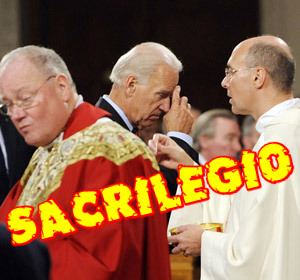St Augustine. (Catena Aurea) (de Verb. Dom.) As for those, as indeed there are many, who either eat that flesh and drink that blood hypocritically, or, who having eaten, become apostates, do they dwell in Christ, and Christ in them? Nay, but there is a certain mode of eating that flesh, and drinking that blood, in the which he that eateth and drinketh, dwelleth in Christ, and Christ in him.
Augustinus de Verb. Dom: Multi quidem, qui vel corde ficto carnem illam manducant et sanguinem bibunt, vel cum manducaverint apostatae fiunt, numquid manent in Christo, et Christus in eis? Sed est profecto quidam modus manducandi illam carnem et bibendi illum sanguinem, quo modo qui manducaverit et biberit, in Christo manet, et Christus in eo.
St. AUGUSTINE. (de Civ. Dei, l. xxi. c. 25.) There are some who promise men deliverance from eternal punishment, if they are washed in Baptism and partake of Christ’s Body, whatever lives they live. The Apostle however contradicts them, where he says, The works of the flesh are manifest, which are these; adultery, fornication, uncleanness, lasciviousness, idolatry, witchcraft, hatred, variance, emulations, wrath, strife, seditions, heresies, envyings, murders, drunkenness, revellings, and such like; of the which I tell you before, as I have also told you in time past, that they which do such things shall not inherit the kingdom of God. (Gal. 5:19. et seq.) Let us examine what is meant here. He who is in the unity of His body, (i. e. one of the Christian members,) the Sacrament of which body the faithful receive when they communicate at the Altar; he is truly said to eat the body, and drink the blood of Christ. And heretics and schismatics, who are cut off from the unity of the body, may receive the same Sacrament; but it does not profit them, nay, rather is hurtful, as tending to make their judgment heavier, or their forgiveness later. Nor ought they to feel secure in their abandoned and damnable ways, who, by the iniquity of their lives, desert righteousness, i. e. Christ; either by fornication, or other sins of the like kind. Such are not to be said to eat the body of Christ; forasmuch as they are not to be counted among the members of Christ. For, not to mention other things, men cannot be members of Christ, and at the same time members of an harlot.





No comments:
Post a Comment
Note: Only a member of this blog may post a comment.